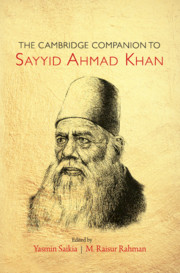Book contents
- Frontmatter
- Contents
- List of Figures
- Notes on Contributors
- Acknowledgements
- A Note on Spellings and Transliteration
- Chronology of Sayyid Ahmad Khan
- Introduction
- Part I Sayyid Ahmad Khan: The rise of a historical figure
- Part II Musalman-e Hind: Indian Muslim in a plural environment
- 5 Creating a Community: Sir Sayyid and His Contemporaries
- 6 Envisioning a Future: Sir Sayyid Ahmad's Mission of Education
- 7 Religion, Science, and the Coherence of Prophetic and Natural Revelation: Sayyid Ahmad Khan's Religious Writings
- 8 Defending the ‘Community’: Sir Sayyid's Concept of Qaum
- 9 Understanding Sir Sayyid's Political Thought
- Part III Sir Sayyid today: Enduring legacies
- Conclusion
- Suggested Further Readings
- Index
7 - Religion, Science, and the Coherence of Prophetic and Natural Revelation: Sayyid Ahmad Khan's Religious Writings
from Part II - Musalman-e Hind: Indian Muslim in a plural environment
Published online by Cambridge University Press: 26 April 2019
- Frontmatter
- Contents
- List of Figures
- Notes on Contributors
- Acknowledgements
- A Note on Spellings and Transliteration
- Chronology of Sayyid Ahmad Khan
- Introduction
- Part I Sayyid Ahmad Khan: The rise of a historical figure
- Part II Musalman-e Hind: Indian Muslim in a plural environment
- 5 Creating a Community: Sir Sayyid and His Contemporaries
- 6 Envisioning a Future: Sir Sayyid Ahmad's Mission of Education
- 7 Religion, Science, and the Coherence of Prophetic and Natural Revelation: Sayyid Ahmad Khan's Religious Writings
- 8 Defending the ‘Community’: Sir Sayyid's Concept of Qaum
- 9 Understanding Sir Sayyid's Political Thought
- Part III Sir Sayyid today: Enduring legacies
- Conclusion
- Suggested Further Readings
- Index
Summary
Should religion and science be reconciled? As one of India's foremost public intellectuals of the nineteenth century, Sayyid Ahmad Khan inhabited the great transition, a hinge period in the shift from the Ptolemaic geocentric to the Copernican heliocentric view of the universe. Sayyid Ahmad Khan is highly regarded as the ‘Father of Modern Islam’ worldwide. His interests spanned across diverse fields of enquiry, and no study of this towering figure can be considered complete apart from a careful evaluation of his religious ideas. However, this is not an easy task. Sayyid Ahmad was a complex thinker living in a complicated context during a period when significant political, social, and intellectual changes occurred. The primary concern of Sayyid Ahmad was to articulate religious knowledge in the light of advancements in science; he attempted this through necharī philosophy, which is addressed in detail elsewhere in this volume.
Although numerous insightful studies have been conducted on Sayyid Ahmad's religious writings in general and on his rationalist and naturalist conclusions in particular, the purpose behind this ‘social revolutionary's’ concern regarding the interrelation of prophetic and natural revelation remains unclear. This concern persisted throughout his extensive literary career. Sayyid Ahmad examined nearly every aspect of religious practice in the light of the Qur’ān and of plain reason. He argued that if the clutter of tradition is removed, then pristine religion would emerge to be consistent with the ‘new sciences’ and compatible with the highest orders of human intellect. Pure (thet) Islam, which was understood and announced by prophets, was revealed through both prophetic and natural revelation. The prophetic revelation of pure Islam never contradicts its natural revelation.
Although prophetic messages provide instructions, the original sharī`ah, which is the nature's message, is no less recognized for being inarticulate. Then, the prophetic message must harmonize with the nature's message without contradiction. Thus, if a belief contradicted a basic common sense, then it was dismissed. If a scriptural passage contravened a simple reason, then that passage required a figurative rather than a literal interpretation.
Shamsur Rahman Faruqi, a novelist and historian, captured the complexity of this legacy by stating that ‘Sayyid Ahmad Khan was a saviour, a sage, and a political-social leader of tremendous credibility. His theology didn't enter into the matter at all’.
- Type
- Chapter
- Information
- The Cambridge Companion to Sayyid Ahmad Khan , pp. 138 - 158Publisher: Cambridge University PressPrint publication year: 2019



